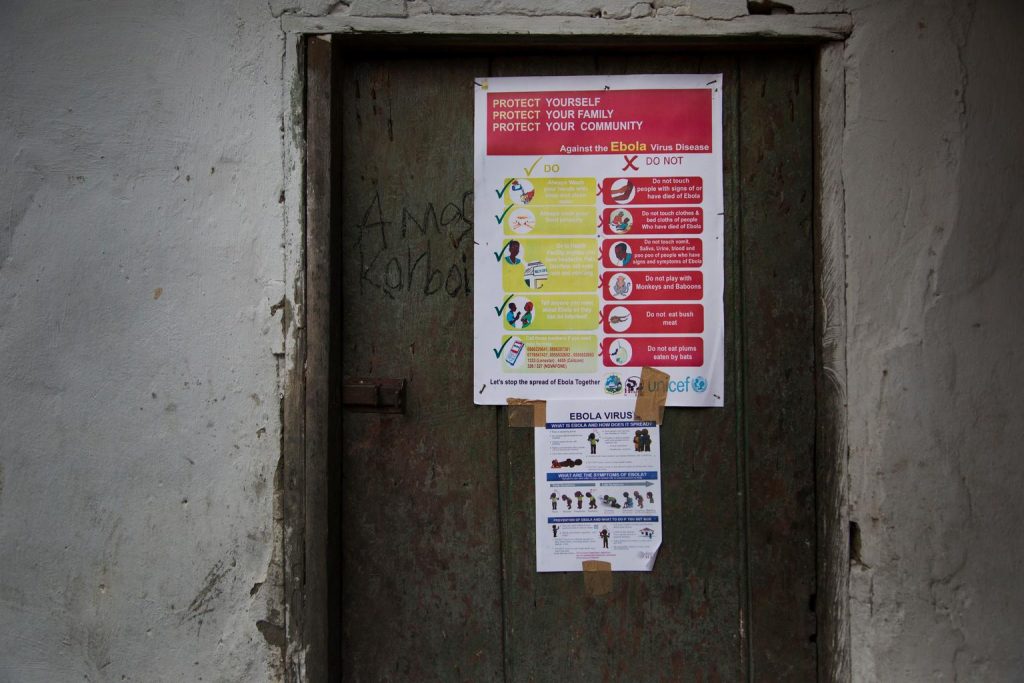Health workers face suspicion and a lack of cold storage as they test the Ebola vaccine and also try to reach children who have missed inoculations against other diseases.
Briefing
Ebola Vaccine Trial in Sierra Leone Battles Against Fear and Logistics

On 29 August in Liberia, a large poster, among those being distributed by UNICEF, is affixed to a door in Dolos Town in Margibi County. The poster bears information and illustrations on the symptoms of EVD and best practices to help prevent its spread. Such preventative practices include washing ones hands with soap and clean water; visiting a health clinic if one experiences a headache, fever, vomiting, pain, diarrhoea, red eyes or a rash; and avoiding risky behaviours such as touching people who have signs of the disease. The poster bears the UNICEF logo.
The worst outbreak of Ebola virus disease (EVD) in history continues to ravage communities in West Africa. UNICEF estimates that 8.5 million children and young people under the age of 20 live in areas affected by EVD in Guinea, Sierra Leone and Liberia, countries where disease transmission is widespread and intense. Of these, 2.5 million are under the age of 5. Preliminary UNICEF estimates also indicate that at least 3,700 children in Guinea, Liberia and Sierra Leone have lost one or both parents to EVD since the start of the outbreak. Nigeria and Senegal are also affected, having experienced an initial case or cases, or localized transmission. UNICEF remains at the forefront of efforts to respond to and help curtail the outbreak. In Guinea, UNICEF has been distributing bars of soap, bottles of chlorine for handwashing and household water treatment, and flyers with information on EVD; preventative practices have also been shared through a door-to-door campaign supported by UNICEF and partners. In Liberia, UNICEFs partners, in co-ordination with the Ministry of Health and Social Welfare and the United States Agency for International Development (USAID), are distributing household protection kits in the hardest-hit areas. The kits contains critical supplies protective gowns, gloves and masks, as well as soap, chlorine and a sprayer, along with instructions on the use and safe disposal of materials
See also
Briefing
Effective vaccine rollout and uptake in Sierra Leone
This Key Considerations brief proposes key considerations for ongoing vaccination efforts in Sierra Leone, including for the hepatitis vaccine and new malaria vaccine (RTS,S/AS01 (RTS,S)), offering insights on planning equitable vaccine campaigns for new infections.
West Africa Hub
SSHAP
2024
Related content
Case study
SSHAP learning note: Building a localised approach
This learning note shares insights, experiences and lessons from SSHAP's approach to the localisation of its operational responses in sub-Saharan Africa.
Central and East Africa Hub
West Africa Hub
SSHAP
2025
Evidence review
Rapid evidence synthesis: Mpox community protection
This note presents a rapid synthesis of evidence related to community protection in countries affected by the mpox clade 1b outbreak. Synthesising evidence related to community protection for mpox Medline, Africa Journals Online and Global Index Medicus were searched. IFRC,…
SSHAP
2025
Report
Meeting report: The impact of global aid funding cuts on people and programmes in South Sudan
Report of a roundtable with government actors, academics, development partners and journalists in South Sudan on the sweeping impacts on people and programmes of aid cuts and multiple, intersecting crises.
Central and East Africa Hub
SSHAP
2025
Briefing
Key considerations: Home-based care for mpox in Central and East Africa
This brief outlines key considerations on health system requirements for safe and inclusive home-based care for mpox.
Central and East Africa Hub
SSHAP
2025


